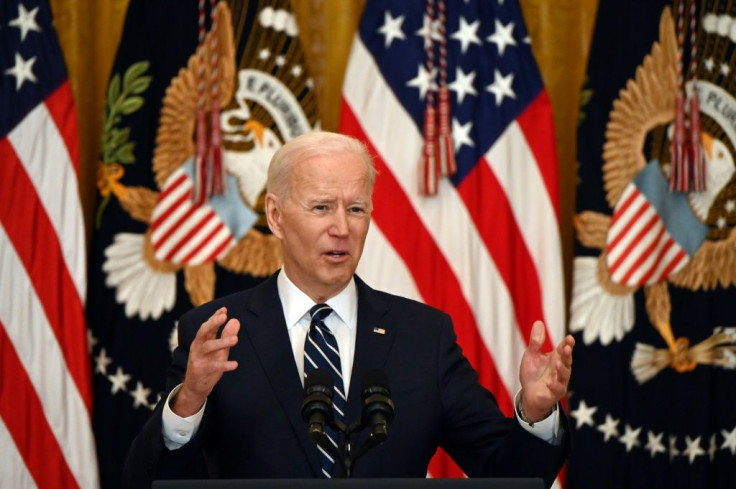Biden Sees Afghan Withdrawal This Year But Not By May Deadline
US President Joe Biden on Thursday gave his clearest signal yet that he would not meet a deadline to pull out all troops from Afghanistan by May 1 but said he would likely end America's longest war within the year.
"It is going to be hard to meet the May 1 deadline in terms of tactical reasons. It's hard to get those troops out," Biden said in his first press conference since taking office on January 20.
"We will leave; the question is when we leave," he said. "But we're not staying a long time."
Asked whether he envisions US soldiers still in Afghanistan in 2022, the president said: "I can't picture that being the case."
Under an agreement negotiated by Donald Trump's administration with the Taliban, the United States is supposed to pull out all its troops by May 1, nearly two decades after the invasion in the wake of the September 11 attacks.

The Islamist insurgents in turn promised to open peace talks with President Ashraf Ghani's government, although there has been little sign of headway since the meetings began in September in Qatar.
The Taliban also vowed not to allow territory to be used by "terrorists" -- the original goal of the US invasion following the September 11, 2001 attacks.
Biden's acknowledgement comes one week after he said he was in the process of making a decision over the troops, and that a withdrawal on time "could happen, but it is tough."
Last week the Taliban warned there would be "consequences" if Washington did not stick to the agreed timetable -- further raising pressure on the fragile peace process.
On Thursday, Biden noted ongoing international discussions on Afghanistan, including Secretary of State Antony Blinken's meetings with NATO allies that have troops in Afghanistan.
"And if we leave, we're going to do so in a safe and orderly way," Biden said.
Turkey has been organizing a conference of major powers on Afghanistan in hopes of building international consensus on the country's future.
The Taliban have largely stuck to a promise not to attack US or other foreign troops since the agreement was struck in February last year, but they say the date for the withdrawal of US troops is inflexible.
As Barack Obama's vice president, Biden was one of the most prominent proponents of winding down the US involvement in Afghanistan, judging that little else can be gained.
But he has recently mused about leaving a residual force in Afghanistan to carry out counterterrorism operations -- an option likely to be rejected by the Taliban.
Representative Adam Smith, a member of Biden's Democratic Party who heads the House Armed Services Committee, said this week that the administration wanted at least to sound out the Taliban on allowing a counterterrorism force.
But he said that the overall decision remained to withdraw.
"I'm not terribly optimistic," he said of Afghanistan's future, "but I don't think that lack of optimism changes if the US stays for another year or another 10."
Speaking to a forum of Foreign Policy magazine, Smith said the delay was "purely logistical."
"Running for the exits pell-mell by May 1 is dangerous," he said.
"If someone can present to me the military argument that between now and May 1 we can yank 10,000 troops and all the support staff and all the equipment and everything out, well, then you're a miracle worker," he said, giving a figure that includes allies.
© Copyright AFP 2024. All rights reserved.





















